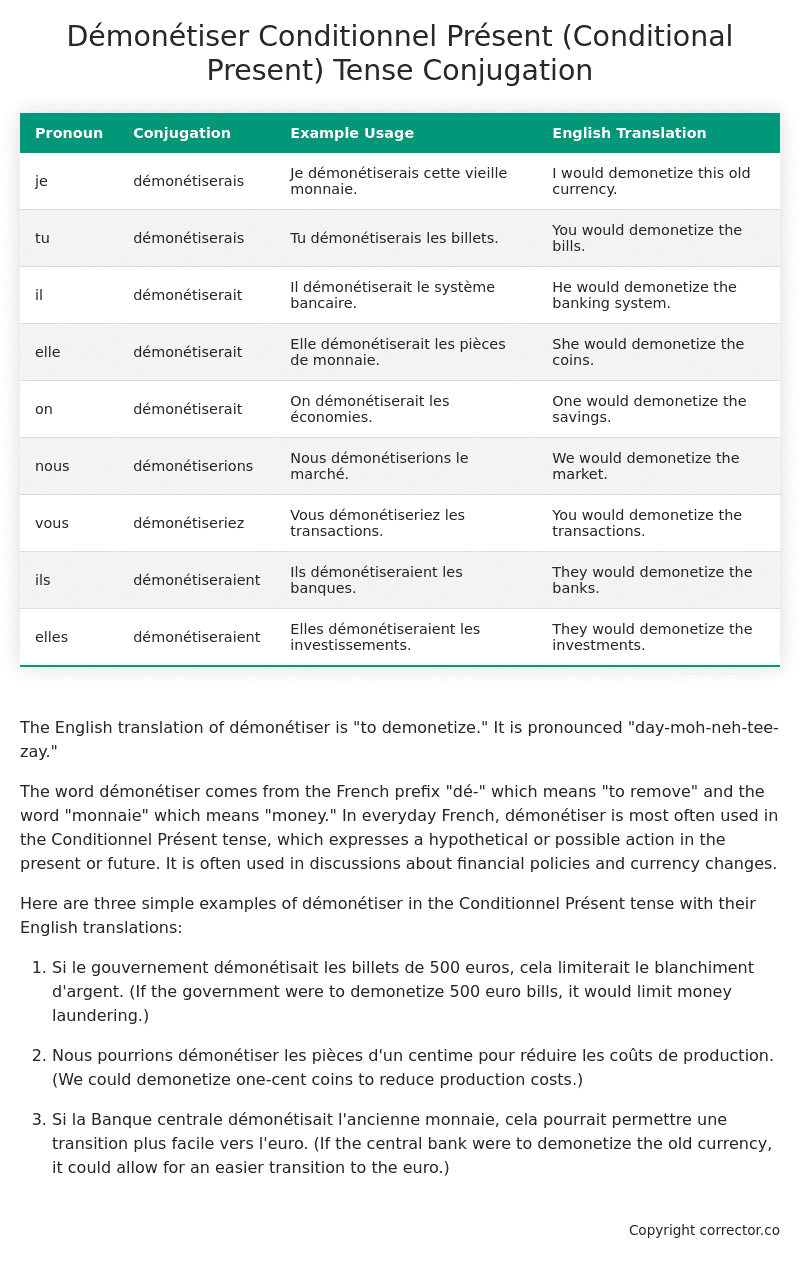Conditionnel Présent (Conditional Present) Tense Conjugation of the French Verb démonétiser
Introduction to the verb démonétiser
The English translation of démonétiser is “to demonetize.” It is pronounced “day-moh-neh-tee-zay.”
The word démonétiser comes from the French prefix “dé-” which means “to remove” and the word “monnaie” which means “money.” In everyday French, démonétiser is most often used in the Conditionnel Présent tense, which expresses a hypothetical or possible action in the present or future. It is often used in discussions about financial policies and currency changes.
Here are three simple examples of démonétiser in the Conditionnel Présent tense with their English translations:
-
Si le gouvernement démonétisait les billets de 500 euros, cela limiterait le blanchiment d’argent. (If the government were to demonetize 500 euro bills, it would limit money laundering.)
-
Nous pourrions démonétiser les pièces d’un centime pour réduire les coûts de production. (We could demonetize one-cent coins to reduce production costs.)
-
Si la Banque centrale démonétisait l’ancienne monnaie, cela pourrait permettre une transition plus facile vers l’euro. (If the central bank were to demonetize the old currency, it could allow for an easier transition to the euro.)
Table of the Conditionnel Présent (Conditional Present) Tense Conjugation of démonétiser
| Pronoun | Conjugation | Example Usage | English Translation |
|---|---|---|---|
| je | démonétiserais | Je démonétiserais cette vieille monnaie. | I would demonetize this old currency. |
| tu | démonétiserais | Tu démonétiserais les billets. | You would demonetize the bills. |
| il | démonétiserait | Il démonétiserait le système bancaire. | He would demonetize the banking system. |
| elle | démonétiserait | Elle démonétiserait les pièces de monnaie. | She would demonetize the coins. |
| on | démonétiserait | On démonétiserait les économies. | One would demonetize the savings. |
| nous | démonétiserions | Nous démonétiserions le marché. | We would demonetize the market. |
| vous | démonétiseriez | Vous démonétiseriez les transactions. | You would demonetize the transactions. |
| ils | démonétiseraient | Ils démonétiseraient les banques. | They would demonetize the banks. |
| elles | démonétiseraient | Elles démonétiseraient les investissements. | They would demonetize the investments. |
Other Conjugations for Démonétiser.
Le Present (Present Tense) Conjugation of the French Verb démonétiser
Imparfait (Imperfect) Tense Conjugation of the French Verb démonétiser
Passé Simple (Simple Past) Tense Conjugation of the French Verb démonétiser
Passé Composé (Present Perfect) Tense Conjugation of the French Verb démonétiser
Futur Simple (Simple Future) Tense Conjugation of the French Verb démonétiser
Futur Proche (Near Future) Tense Conjugation of the French Verb démonétiser
Plus-que-parfait (Pluperfect) Tense Conjugation of the French Verb démonétiser
Passé Antérieur (Past Anterior) Tense Conjugation of the French Verb démonétiser
Futur Antérieur (Future Anterior) Tense Conjugation of the French Verb démonétiser
Subjonctif Présent (Subjunctive Present) Tense Conjugation of the French Verb démonétiser
Subjonctif Passé (Subjunctive Past) Tense Conjugation of the French Verb démonétiser
Subjonctif Imparfait (Subjunctive Imperfect) Tense Conjugation of the French Verb démonétiser
Conditionnel Présent (Conditional Present) Tense Conjugation of the French Verb démonétiser (this article)
Conditionnel Passé (Conditional Past) Tense Conjugation of the French Verb démonétiser
L’impératif Présent (Imperative Present) Tense Conjugation of the French Verb démonétiser
L’infinitif Présent (Infinitive Present) Tense Conjugation of the French Verb démonétiser
Struggling with French verbs or the language in general? Why not use our free French Grammar Checker – no registration required!
Get a FREE Download Study Sheet of this Conjugation 🔥
Simply right click the image below, click “save image” and get your free reference for the démonétiser Conditionnel Présent tense conjugation!

Démonétiser – About the French Conditionnel Présent (Conditional Present) Tense
Formation
Common Everyday Usage Patterns
Expressing Polite Requests
Expressing Hypothetical Situations
Expressing Doubt or Uncertainty
Interactions with Other Tenses
Present Tense
Past Tense
Future Tense
Conditional Perfect
Summary
Want More?
I hope you enjoyed this article on the verb démonétiser. Still in a learning mood? Check out another TOTALLY random French verb conjugation!


